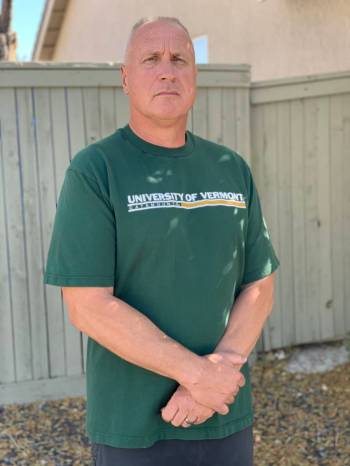Genevieve Bush 89 of Chester County, Pennsylvania
Before the Guardianship
Today
Nearly a decade in, Genevieve Bush, 89, continues to
be held in guardianship against her will, against advanced directives, her life
savings is nearly depleted.
The
Estate Battle
Bush’s saga started approximately fifteen years ago,
when Genevieve Bush’s sons, Joseph and Michael, challenged the estate of her
and her husband.
After her husband had a stroke and was hospitalized
in November 2003, they saw an opening, according to a letter she wrote in 2007,
to her brother Leon.
“In April 2004, before Fabian (her husband) passed,
Joseph asked me to sign a blank check…Joe asked me to sign more blank checks so
he could move the money…In May of 2005, Joe called me and told me he was
putting stocks in my name…Then, (a) month later in June, Joe Decided to give
papers about me being an estate, like I was already dead.”
At the time, Joseph and Michael had power of
attorney power which Genevieve quickly sought to overturn after the squabble
turned bitter and wound up in court.
“I, Genevieve Bush,” she stated in a notice of
revocation of power of attorney dated September 6, 2005, “do hereby revoke any and all powers of
attorney given to Joseph Bush.” (she also revoked Michael Bush’s power of
attorney at the same time)
Four days later, the Chester County of
Pennsylvania Department of Aging showed
up to test Genevieve, according to the same letter, “On September 10, 2005, the
Department of Aging came to Mary’s home (where Genevieve was then staying) with
the State Police and gave me a competency test.”
Genevieve stated that the Department of Aging came
because Joseph complained to them. While she passed the test, her ordeal was
not over.
“September 13, 2005, the Department of Aging came to
my house. I told her to leave me alone.
‘This is all about money.’ That day all three sons
called me on the phone. I guess they wondered if I got removed from my home….We
started the new year (2006) just great. Joe called threatening to call the
Department of Aging again.”
Bush hired attorney Jay Fischer to represent her and
he sent a letter to Joseph on November 21, 2005, stating in part.
“In addition, you are requested to return all funds,
investments or other accounts transferred into your name to your mother
immediately.”
Fischer continues to practice law in Pennsylvania
but did not respond to a voicemail at his office.
A court fight over the estate resulted and this even
included a brutal deposition of Genevieve which lasted between four and six hours.
She described it in her letter. “All of them were
there with lawyers. I brought a lady friend for support, but they would not let
her in. I felt attacked, question for four hours straight.”
The matter was finally decided on October 2007, when
Judge Robert Shenkin ruled in favor of Genevieve’s sons, that the monies were
“gifted to them” according to a timeline Mary provided.
The full letter Genevieve wrote is below.
https://www.scribd.com/document/419291024/2007-Letter
The
Incapacitated Claim
While Genevieve lost, Mary told me she still had
over $1 million left after the settlement. She went ahead with her life until
2009, speaking rarely to her sons.
That all remained until on October 30, 2009, a
petition was filed with the Chester County Orphans Court by her two sons to
have Genevieve declared incapacitated.
“Now comes Joseph Bush and Michael Bush, sons of the
alleged incapacitated person, Genevieve Bush, through their attorney, Alex
Chotkowski,” their petition stated, “and hereby Petition this Honorable Court
for the Declaration of Incapacitation and the Appointment of an Emergency
Guardian for Genevieve Bush and an injunction.”
An incapacitated person “means that you are not able
to receive and evaluate information and communicate decisions and that you are
unable to manage your money and/or property, or to make necessary decisions about
where you will live, what medical care you will get, or how your money will be
spent,” they stated in the petition.
Chotkowski still practices law and continues to
represent Joseph and Michael today but he did not respond to an email for
comment.
When someone is accused of being incapacitated,
their case goes to probate court as a guardianship or sometimes called
conservatorship.
This is a civil, not criminal court, where the
protections of a criminal court for an accused often don’t apply.
Chotkowski described the reasons needed for the
declaration in the petition.
“Petitioners believe that guardians should be
appointed for the alleged incapacitated person because the alleged
incapacitated person cannot manage her financial and cannot care for herself
without the assistance of skilled caregivers. The physical condition of the
alleged incapacitated person is that she is in poor physical condition due to
her advanced age.
The matter wound up in front of Judge Katherine
Platt.
On June 24, 2011, Platt made her decision.
“The nature of the condition or disability which
impairs Respondent’s (Genevieve Bush) capacity to make and communicate
decisions is cognitive decline due to Alzheimer’s.” Platt stated in ruling her
incapacitated. “The extent of Respondent’s capacity to make and communicate
decisions is severely impaired.”
But Mary Bush told me the hearing was a farce, Platt
made the decision without giving Genevieve Bush any chance to be heard, “Mom
never had a single day in court and Judge Platt never met or saw my mother”,
Mary told me.
Furthermore, no one had claimed Genevieve ever had
Alzheimer’s or claimed she had Alzheimer’s since 2006, even though no such
evidence was introduced.
“The duration of such guardianship shall be
permanent.” Platt stated, nonetheless in her decision.
Judge Platt did not return a voicemail at her
chambers and a subsequent email to Stacey Witalec, the press contact for the
Unified Judicial System of Pennsylvania, was also not returned.
Judge Platt remains on the case today.
The
Uneasy Set-Up
Initially, there was an uneasy dynamic created. Mary
shared guardianship with her brothers. Judge Platt ordered Joseph to be
guardian of the estate, while Michael and Mary were made guardian of the
person.
Genevieve initially lived at her home.
It was a troubled dynamic that continued to be
abusive to Genevieve, particularly when her sons petitioned the court for
another evaluation.
“AND NOW, this 12th day of February 2013, upon the
Motion to Compel an evaluation of Mrs. Genevieve Bush IP., by Movants Michael
and Joseph Bush, it is hereby ordered,” Judge Platt’s order stated.
They did this even though another court appointed
evaluator submitted their report on October 21, 2011.
“Dr. Sarah Stookey, court appointed psychologist
concluded her evaluation of Genevieve Bush that she became very agitated around
Michael and said to her ‘wants none of that’ when reminded of her session with Michael.
Judge Platt ignored the report from her own court
appointed doctor.” Mary stated
This created all sorts of drama, particularly in
arranging for this evaluation.
George Zumbano represented Genevieve during this
period, and he sent a letter to Judge Platt stating.
“I write to Mr. Chotkowski’s letter to you. First
and foremost, this whole most unfortunate disagreement arises because Mr.
Chotkowski failed, contrary to your direction, to circulate the Order to
counsel prior to submitting it to Your Honor
for signature.
“Be that as it may, let me simply address two brief
issues. As to the 10:30AM time frame, we will do our best with Mrs. Bush. My
understanding was that she couldn’t be dressed, fed, etc. under her normal
routine before 11AM.”
Zumbano continues practicing law but he did not
respond to an email at his work email.
The initial evaluation turned into a nightmare,
according to an email from Mary’s then lawyer, Clifford Cohn to Chotkowski from
February 13, 2013.
“Apparently a
caregiver had to leave at 9AM. I understand the doctor did not feel comfortable
interviewing Mrs. Bush without someone else being present. As nobody else
meeting the criteria as set forth in the order had been obtained to stay with
Mrs. Bush, she apparently left without doing the interview. I suggest we reschedule
as soon as possible.”
Cohn did not respond to a message at his office.
At around this time, Mary was removed as guardian of
the person by Judge Platt, and she was replaced by Elizabeth Srinivasan in 2013.
Srinivasan is an attorney who sometimes acts as a
professional guardian; she did not respond to a message at her office.
In 2015, the Chester County Pennsylvania Department
of Aging stepped in, Mary told me.
“My mom was punched in her abdomen, (and the)
department of aging removed her,” she told me.
As a result, Judge Platt removed everyone from the
guardianship matter and replaced them with Carol J Hershey, who is also a
professional guardian.
Carol
Hershey and the Vicious Cycle
Things have only gone from bad to worse for Mary,
she told me. Her mother is now in a home, where Mary provided PA Health
Department citation evidence, she is not receiving proper care.
“Based on a review of the facility abuse policy,
clinical records, and staff interviews, it was determined that the facility
failed to fully investigate allegations of abuse to a resident,” according to a
report about one facility Genevieve stayed at.
Mary also provided photos where her mom also appears
isolated and mistreated.
Hershey, “tried to charge me with trespassing,
always maligned me, restricted visits,” Mary said, of the things Hershey has
done.
She said Hershey ordered that each visit be
supervised and charge from $400-500 for a once a week visit.
Bush remains undaunted.
On November 1, 2018, Judge Platt denied one of
Mary’s motions; this, among other things, asked for Hershey to be removed.
On November 2, 2018, Judge Platt disregarding a
higher courts order gave guardianship of the person back to Michael Bush who
did not file a petition, thus ignoring Mary again. The Pennsylvania Superior
Courts Order No. 3207 EDA 2015 dated February 21, 2017
(permanently removed Michael Bush as a Co-guardian or Plenary Guardian of
Genevieve Bush.)
February 21, 2017, higher courts decision states on
page 8; "The record supports the trial court’s findings and conclusion
that Michael’s appointment, as either sole or co-guardian of the person, would
not fulfill Mrs. Bush’s best interests. See 20 Pa.C.S.A. § 5521 (duty of
guardian of the person to pursue an incapacitated person’s best interest).
Michael’s actions have ignored Mrs. Bush’s best interests." “he has been
passive about her medical care, physical therapy and encouraging her social
life.”
On May 7, 2019, she sent Judge Platt what she
referred to as a Memorandum of Understanding.
“Let this be our Memorandum of Understanding, with
all parties copied on the above-referenced issue; that according to statements
made by Terri Clark the Chester County Register of Wills/Clerks of the Orphan’s Courts on May 6, 2019, to me Mary Bush, that you
have given an Oral Order to the Clerk of the Orphan’s Court, not to allow me
access to any of the Guardianship Reports from 2015 to the present times that
contains substantive issues.
“As you know I have been a party to this matter of
my natural mother Genevieve Bush since the onset of this matter starting in
2009 to the present." Carol J.
Hershey (professional for-profit guardian)
“tried to charge Mary Bush (daughter) with trespassing, always maligned
Mary Bush, restricted Mary Bush's visits,”
this is just some, of the things Carol Hershey has done.
Mary Bush said Hershey ordered that each visit be
supervised and charge from $400-500 for a once a week visit.
Mary Bush remains undaunted and willing to protect
her mother to the best of her ability.
Written By: Michael Volpe
Full Article & Source:
The State of Pennsylvania "Cash for the Elderly" is MURDERING the elderly for the profit of Judges "friends"











